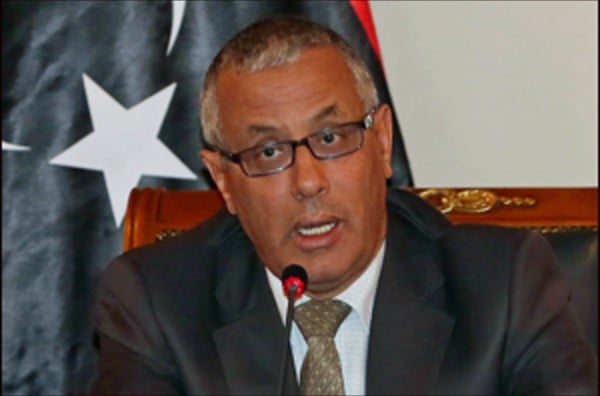
(AFP) Former Libyan Prime Minister Ali Zidan
In its most hard-worded statement to date, the Libyan government on Mar. 20 vowed to eliminate terrorism and mobilize “the national military force” to confront the threat. According to the release, “the cities of Benghazi, Derna, Sirte and others face a terrorist war led by Libyan and foreign elements that have hostile and sinister agendas.”
The embattled government also called for international help to curb rampant security threats.
Mar. 19 marked the anniversary of the launch of the NATO-led military campaign that helped ouster Muammar Qadhafi. Three years later, the country is beset by almost daily internecine fighting, attacks on security officers, foreigners and activists, economic problems, oil blockades and virtually non-existent political process.
While international cooperation was pivotal to ejecting Libya’s idiosyncratic dictator during the uprising, assistance lacks luster in its restive aftermath. Earlier this month, representatives of over thirty countries converged on Rome to discuss how to stabilize Libya. The biggest international gathering in two years was rife with rhetoric but sparse on specifics.
Foreign efforts to help Libya founder on the fundamental problem of institutional non-existence, which was epitomized in last week’s sacking of Prime Minister Ali Zidan after the infamous oil tanker incident. When militias loaded a North Korean-flagged vessel with crude oil worth $30 million from a rebel-held port, Zidan’s beleaguered government offered tough words but little capacity to impose order. The ex-premier vowed to bomb the tanker — threats that rang hollow in a country of unclear lines of authority and tenuous loyalties.
In his first public interview since the dismissal, Zidan admitted that his requests to “prepare a force to take action were ignored” and the military did not carry out his orders. The disheartened premier tried soliciting help from loyal militias but their limited capacities and “weather conditions” allowed the tanker to escape to sea, throwing the sinking government into further disarray.
While existing international regulations would prevent rebels from benefiting from the illicitly obtained crude anyway and the U.S. Navy SEALs intercepted the tanker to return to Libya, the incident became emblematic of the government’s contracting reach and growing irrelevance.
International efforts to train and assist the military are built on a problematic premise that Libya operates as a nation-state. Libyan Foreign Minister Mohamed Abdulaziz in Rome acknowledged that his country “suffers from the inexistence of institutions,” which makes it markedly different from Tunisia and Egypt.
Meanwhile, Ambassador to France Alshiabani Mansour Abuhamoud went even further claiming that his country not only failed to inherit “a state in the technical sense of the term,” but even “a culture of institutions among people.”
Admittedly, the society is bitterly divided, with deep scars left unhealed since the civil war. The state lacks basic attributes of a functioning government – such as monopoly on violence, resources and popular legitimacy.
The government’s glaring inability to follow through on its threats and safeguard the country’s resources erodes public trust, which manifested itself starkly in the Feb. 20 constituent assembly poll where only 15 percent of eligible voters cast ballots.
While Libya faces truly formidable challenges in establishing a normally functioning state, it may need to glean lessons from its tiny western neighbor. As chaotic and sporadic as the Tunisian transitional process may have looked, it nevertheless took place within the confines of the political arena.
National disputes were largely solved within the National Constituent Assembly, and differences settled through deliberations and debate. Such venue is absent in Libya where abundantly available weapons are the primary tools of exerting political influence, and militias employ them copiously to press their demands.
The General National Congress, elected in July 2012, is discredited as a corrupt and inefficient platform for Islamist-leaning militias that even security officers are loathe to protect. When protesters stormed the parliament earlier this month, some reports say that security guards cheered on rioters who shot two deputies.
Libya can look to Tunisia to heed lessons on building an inclusive transitional body that represents minorities and transcends ideological rivalries. The just-elected constitution-drafting body inherently lacks this capacity as it is based on a divisive formula boycotted by the Amazigh and Tebu minorities who fear that the constitution will not protect their rights.
But beyond that, the country needs a sustained and concerted international effort to help erect a law-governed state from scratch that exercises monopoly on violence and control over resources.